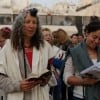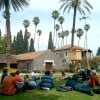My Bobbie, as we called her in Manchester when I was a kid, (my father’s mother, z”l) was born on this day – in 1892. How crazy is that? That’s as far distant from today as the year 2138 – a number that seems more like the 4–digit combination for a bike lock than an actual calendar year. 12 days from now I’m going to the New York dinner for the 500th anniversary of my high school. It was founded in 1515 by Hugh Oldham, 94 years before Henry Hudson sailed up the river that now bears his name. Will MGS be around to celebrate the next 500, in the year 2515? And so I wonder: what are the cycles of time that make sense to us, and why? This coming Sunday is the last day in a 7–year cycle of Jewish life that began the evening of Monday September 29th, 2008. Sunday night – Rosh Hashanah, the Jewish new year – starts a new cycle that ends on the last day of the next shmita year, which will be September 25th, 2022. Thus more so than most years, now is a time for looking back and looking forwards. For […]















